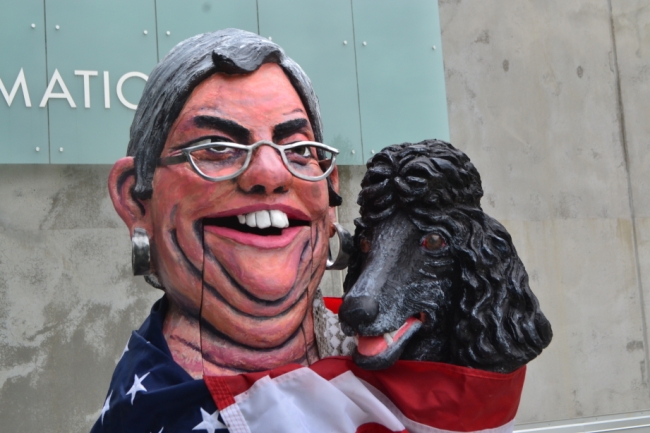You have /5 articles left.
Sign up for a free account or log in.

George Rammell's 'Blathering On in Krisendom'
Courtesy of George Rammell.
At British Columbia’s Capilano University, the administration seized a sculpture caricaturing the university president on the grounds that it constituted “harassment” of President Kris Bulcroft.
The Capilano instructor who created the sculpture, George Rammell, said that the artwork, which depicts Bulcroft and her poodle as ventriloquist dolls wrapped in an American flag, was removed from the university’s studio art building without his knowledge on the night of May 7. When he discovered the disappearance the next morning he said he was told by campus security officials that it had been removed by order of the upper administration.
He subsequently learned that the sculpture, titled Blathering On in Krisendom, had been "partially dismantled" in the move, which raises concerns for him about the possibility of damage: "It’s a solid welded sculpture with an acrylic polymer casting over it. You can’t dismantle that; it’s one unit. What does that mean, 'dismantled'?"
Two weeks have passed and Rammell still doesn't know; he doesn't even know where the sculpture is. The university administration has said that the sculpture will be returned to him on the condition that it not be brought back to campus -- a condition that the president of Capilano’s board, Jane Shackell, expressed support for in a statement defending her decision to direct the removal of the sculpture, or, as she called it, the “effigy.”
“The decision to remove the effigy was not taken lightly, but rather was the result of endeavoring to find the right balance among many competing values,” Shackell wrote. She said that while Capilano “is committed to the open and vigorous discourse that is essential in an academic community, the inherent value of artistic expression, and the rights to free speech and protest that all Canadians enjoy,” it also has an obligation “to cultivate and protect a respectful workplace in which personal harassment and bullying are prohibited.”
“I am satisfied that recently the effigy has been used in a manner amounting to workplace harassment of an individual employee, intended to belittle and humiliate the president,” Shackell said in the statement. A university spokeswoman said that Shackell, rather than the president, would be speaking on behalf of the university on this issue; Shackell was not available for an interview on Tuesday.
“What they don’t realize is they don’t have a right to control what faculty think and the form we give to those thoughts on campus.”
--George Rammell
President Bulcroft has come under heavy criticism for her decision last year to cut several programs, including the studio arts program, for which Rammell teaches, and textile arts. British Columbia’s Supreme Court ruled in April that the Capilano administration had acted contrary to the province’s University Act in making the cuts to courses and programs without seeking the advice of the Capilano Senate. The university is considering an appeal.
“The sculpture was really made out of a need to respond to my feeling of being violated,” said Rammell. “In Canada we used to be able to make caricatures of politicians and they would have a good laugh over their morning coffee.”
Asked about the board chair’s harassment allegations, Rammell said, “Art doesn’t harass. People harass.”
“What they don’t realize is they don’t have a right to control what faculty think and the form we give to those thoughts on campus,” he said. “They’re supposed to be encouraging intellectual rigor and deconstructive thinking, all those things that make the university the valuable place it is. They’re not recognizing that. I’m telling them I have every right to work on this on the campus in my studio.”
“I am satisfied that recently the effigy has been used in a manner amounting to workplace harassment of an individual employee, intended to belittle and humiliate the president.”
--Jane Shackell, board chair
Sandra Seekins, a member of the art history faculty at Capilano, wrote a letter to the university's board taking issue with Shackell’s rationale for confiscating the sculpture. “The action authorized by the Chair of the Board … provides further proof that the people who suspended the Studio Arts and Textile Arts programs have a minimal understanding of the role of art in our society and no understanding of what is at stake in an anti-censorship position. The very principles of a democracy that permits freedom of expression and free speech have been disregarded as an inconvenient obstacle to the machinations of governance," she wrote.
Steven C. Dubin, a professor of arts administration at Columbia University's Teachers College who studies art and censorship, described the Capilano administration’s decision to remove the sculpture as “pathetic.”
"It sounds like it was handled as badly as it could possibly have been handled. I think they lost all credibility when they levied workplace harassment. That’s absurd,” Dubin said, noting that harassment usually implies a power differential in which the harassed is the comparatively powerless figure.
“People who are in the public as the university president is and who make decisions that affect a lot of people need to have a thicker skin and there needs to be a higher level of tolerance for satire and caricature and so on."








